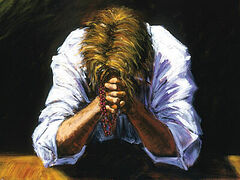On October 21, 2016, the Holy Synod of the Russian Orthodox Church canonized St. Arsenia of Ust-Medvedits as a locally venerated saint of the Volgograd Metropolis.
Abbess Arsenia (1833-1905) came from a notable family of the Don region. At the age of seventeen, Anna Mikhailova entered the Ust-Medvedits Monastery of her own accord. The monastery reached its highest peak in the forty years of her abbacy, from 1864 until her repose on August 3, 1905.
Besides her educational and charitable activities, the main fruits of Venerable Arsenia’s labors were the Kazan Cathedral, which was erected from 1785 to 1885, and the famous caves, dug in the image of the Kiev Caves. Today the monastery’s main shrine is there—the miraculous stone slab with hand and knee imprints of people kneeling in prayer, where the faithful come to beseech St. Arsenia for healings, the good arrangement of worldly affairs, and prosperous family lives.
In addition to her holy life, St. Arsenia left us valuable writings on the spiritual life, which we present in honor of the anniversary of her canonization.
***
Self-knowledge
In the soil of humility good fruits grow. In the awareness of its sinfulness, the soul comes to know the Lord by faith. But in egotism—what will it see or know how to save itself? And your “I,” no matter how good and adorned with goodness it is—what can it give? Neither light nor life. There is a terrible power in it, fighting against all the commandments of God, against others, against God Himself; a power that kills the soul itself, depriving it of goodness, life, God. In moments of peace, it’s difficult to see what kind of spirit drives all human actions, even the good ones, even the desire for salvation, for goodness, for God. But during temptations, things are revealed that were before unclear. If the Lord ruled the soul, then the time of temptations would be a time of victories and crowns for the soul, a time of great prosperity. If the ego controlled a man’s actions, then during temptations its power turns on—and torments the poor soul, as a prisoner, leading it to the very depths of hell.
But still, these moments are better than imaginary peace. In these moments, the soul can truly understand its state, not deceiving itself by its imaginary goodness, and doesn’t consider the concepts of the mind as its own possessions. At this time, if the soul only relates to everything in this blessed moment correctly, the soul can descend very low. And if it agrees to love its own baseness, its utter poverty, if it gives preference to its neighbor and the Lord—it will rejoice that He alone is exalted and that there are parts of my nature that draw near to Him, then it will taste consolation from the good that’s not created by the ego, but rather effects it’s mortification.
The state of the human soul
The state of a fallen sinner’s soul fully corresponds to the words of the Lord: Thorns also and thistles shall [the earth] bring forth to thee (Gen. 3:18). And the earth of our heart constantly grows passions and sins. The activity of a soul not overshadowed by the grace of God, directed toward the purification of the heart, is always difficult, heavy, and powerless. In the sweat of thy face shalt thou eat bread (Gen. 3:19). The passions are uprooted like thorns from the ground with great difficulty and prolonged struggle and again, with a little negligence, during enticing moments, they’re ready to be reborn, and will be born, and grow in the heart, choking out the seed of the word of God that hasn't had time to take root and grow stronger in it. Then it will not only bear fruit but also to nourish the soul. As soon as the source—our mind—is cleansed with great difficulty, the streams of impure thoughts will disturb it again, fill it with impurity, and not allow the thirsting soul to drink the pure water of Divine revelations. In the sweat of thy face shalt thou eat bread.
The soul labors and must labor with bloody sweat so as not to starve to death, so that by this constant heavy work it might not allow the thorns of its passions to grow within itself, so it might not turn into a wilderness, so that by constant purification, by cutting them off, the soul could feed on the daily bread that the Great Sower sows on its ground. The Lord doesn’t leave a man’s labors without recompense. When it overshadows a soul, the grace of God burns the thorns of the passions and brings forth fruit itself. Whoso eateth My Flesh, and drinketh My Blood, hath eternal life… And out of his belly shall flow rivers of living water (Jn. 6:54, 7:38). It is in this state alone that the soul no longer craves to drink from earthly springs. Our work also consists in gradually cleaning these earthly springs, to at least drink pure water from them drop by drop, and not draw up frogs and all kinds of filth from muddy water. In the sweat of thy face shalt thou eat bread, until the Bread that has come down from Heaven feeds you.
The punishments of the Lord
“The proud man’s punishment is his fall,” said St. John Climacus. The Lord wisely uses this punishment as a cure for pride. But all the actions of God’s providence and His punitive allowances are for a man’s good only when he strives to achieve unearthly goals. If he has set the salvation of the One God as the only goal of his life, then everything that happens to him serves for his success. When deprived of all earthly goods, when enduring and accepting blows to all his senses, when enduring dishonor and more—where the strongest soul would be crushed—but having set some earthly good as the goal of his searches, there the God-loving soul receives strength, wisdom, and freedom. And if it loses anything in these sorrows that occur, it loses only that connection with the passions that bound it which it could not break by its own will alone, but because of the passions is only destroyed by the work of God. . It’s a great blessing not to be enslaved to anything earthly, even in the soul’s aspirations. Then every action of God, directed towards salvation, acts beneficially.
The soul that renounces the passions receives a sense of virtues. Having renounced sensuality, it will come to experience humility, and so on. Having renounced its desires, its sin-loving will, its reasonings, it is led into the knowledge of the will of God. In the active fulfillment of the will of God, which is revealed to it for the salvific benefit of another, it’s enlightened by Divine revelations. And once enlightened by them, it enters not only into purity, but also into passionlessness.
On different spiritual states
There can be no proper view of our sinfulness in a state of deadness. A dead man has no eyes with which to see, no tongue with which to entreat. In this state there can be only faith—not living, but firm and unshakeable—that the Creator can recreate again, if it pleases His goodness and His all-holy will, which arranges everything for the salvation of man. When the eyes begin to open, then the vision of one’s sinfulness isn’t forced, but is the natural state of the soul; and the soul’s constant cry of mercy is also natural. But the transition from one state to another can’t be self-willed. You can, of course, come to this vision yourself, because the mind, enriched by reading the word of God, can enter into any spiritual state with the imagination, can stir the senses, move them for a while, and find comfort in this, but this is not the right path, and this labor is fruitless. What you take yourself, you yourself must keep and will surely lose at the slightest collision with life, with reality, because the state was false, dreamy, imaginary. And that which comes from the Lord, that state into which the soul is led by the Lord Himself, is eternal, unchanging. It’s not an action taken by the soul, but its condition. It can lose it only if it completely deviates from the correct spiritual path; and external conflicts, even its own infirmities and passions, will not take from it what has become its eternal inheritance.
The one thing needful
The only thing necessary, the one thing needful, the only thing that gives salvation and life to the spirit, the only goal that all souls and all angelic spirits strive for is the Lord. But it requires comprehensive work for everything to come to this single goal, for everything in the soul to unite in the One being sought, so the soul might seek the Lord in everything, seek the good that leads to Him, and renounce itself and the evil that alienates it from the Lord and gives growth to the ego.
On asceticism
What should our asceticism be like? And what is its goal? Our asceticism should consist in sobering up the body from drowsiness, from laziness, so it would attentively stand in church; in helping the body recover from despondency, the mind from vain thoughts, the heart from passionate feelings, so the inner man might completely stand before the Lord. This is the goal of all asceticism. But will the Lord lead us to achieve this desired goal?
Again, it’s not for us to reason about this, but it would be sinful to give up our asceticism; and only despondency, reinforced by unbelief, based on pleasure, can neglect it, having made it its goal to satisfy its passionate desires.
The asceticism of repentance
This asceticism is difficult and long-lasting, but great and true. And if it’s true, then it’s possible with the help of the grace of God. Indeed, this path is the only true one. We must bring forth fruits of repentance; we must labor where we sinned, arise where we fell, amend that which was ruined, save that which we lost by our own negligence, by our own passions. Salvation is possible in every place and in every affair; it need not be sought outside of us; everything can be found in our souls—both Heaven and Hell. If we find Hell there, then by the grace of God, laboring over ourselves, we can also find Heaven. There is one condition under which flight and a decisive change of life are permissible. This is when our own infirmity has extended to the farthest limits; when the soul lacks the strength not only to labor, but even to endure—when there is a corresponding physical infirmity.
Human sins
Transgressing the commandments of God, we sin both before God and man, and before our own conscience, and we come not only under the judgment of God, but also the judgment of man. By offending the Lord, dishonoring His glory within ourselves, we constantly do harm to others—tempting them, drawing them into sin, setting an example of a sinful life, not helping them on the path to salvation, and we are justifiably given over to the judgment of men. This judgment, manifests as condemnation, obloquy, slander, hatred, and all the deeds that ensue from such a view of us: persecution, torment, death, must be accepted as a worthy recompense; we must always feel indebted to others.
Passions
The passions have such power and authority over a man that having surrendered to them once, we become their prisoners, they shackle us, and give us no opportunity to get free.
They blind our minds and prevent us from seeing ourselves and our path clearly. Beware of giving free rein to your passions, but rather give yourself to working on the commandments of God so as to be a servant of God.
On sorrows
By inducing sorrows, the enemy is strengthened in destroying the soul, inclining it towards despondency, towards grumbling, towards a lack of love for others; and the Lord, allowing these sorrows, wants to save the soul, giving it the chance to fight for courage patience, spiritual reason, and finally, humility, when these very sorrows exceed our strength. Amidst these paths stands the soul, and wherever it inclines, that path will accept it and lead it to its goal.
Remembrance of death
It’s good to have the remembrance of death, but with reason.
Then it serves for renunciation, for contrition, for a broken spirit, for humility. If it produces despondency, then the remembrance of death itself will not lead to salvation, but to destruction.
In times of despondency, it’s better to remember the mercy of God, His goodness, the gifts He sends us, the salvation He gives us, and the circumstances of life and our falls.
Everything is good in its own time, but even the best thing can cause harm if at the wrong time. But there’s one work for which it’s always the proper time—humility of spirit, which is best of all.
On spiritual confusion
The Holy Fathers always advise never to make any decisions during a time of spiritual confusion. When we are perplexed in spirit, we can’t reason correctly and sensibly, and even less can we come to know the will of God with a clear conscience and peaceful heart.
Both the heart and the spirit are confused, and the soul is unable to see the sun of Truth.







